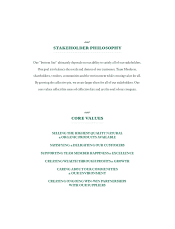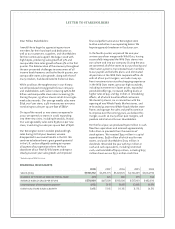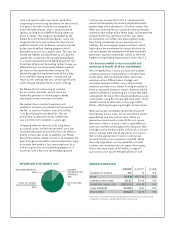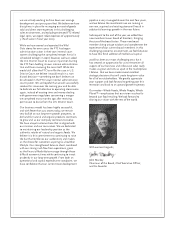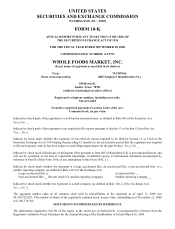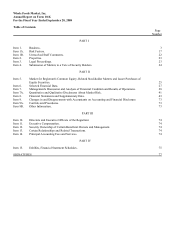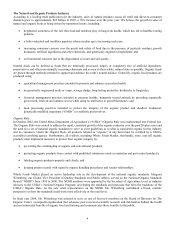Whole Foods 2008 Annual Report Download - page 12
Download and view the complete annual report
Please find page 12 of the 2008 Whole Foods annual report below. You can navigate through the pages in the report by either clicking on the pages listed below, or by using the keyword search tool below to find specific information within the annual report.Our core values are:
• selling the highest quality natural and organic products available;
• satisfying and delighting our customers;
• supporting team member happiness and excellence;
• creating wealth through profits and growth;
• caring about our communities and our environment; and
• creating ongoing win-win partnerships with our suppliers.
These core values speak to our belief in a balanced way of doing business. They very succinctly express the purpose of our
business, which is not only to make profits, but to create value for all of our major stakeholders – our customers, team
members, suppliers, investors, and the community and environment. All are linked interdependently.
Foundations
In 2005, we created two independent, non-profit organizations, the Animal Compassion FoundationTM and Whole Planet
FoundationTM, designed to reach our larger community stakeholders. The two private foundations were initially funded with
seed money totaling over $1 million raised from two global “Five Percent Days,” in which five percent of the amount of all
customer purchases at our stores was donated to the foundations. Both foundations have been aligned with the mission we set
forth more than 28 years ago with respect to community involvement and responsibility. As we have grown and are doing
more business around the world, we believe it has become increasingly important for us to extend our vision of “community”
from our backyards to the global markets in which we are trading.
Although the Animal Compassion Foundation had much success leading and funding on-farm research and producer
workshops to learn and share best practices that support animal needs and behaviors, in the fall of 2007, the Animal
Compassion Foundation’s Board of Directors voted to transition it from a private foundation into a new public foundation in
order to make an even greater impact worldwide on the way animals raised for meat are cared for from birth to slaughter.
The new organization, called the Global Animal Partnership, was launched in spring 2008, switching its primary focus away
from the former Animal Compassion Foundation’s research and education activities to concentrating its efforts on the further
development and launch of the 5-Step Animal Welfare Rating system.
The Whole Planet Foundation’s mission is to create economic partnerships with the poor in the developing-world
communities that supply our stores with product. Through innovative assistance for entrepreneurship – including direct
micro-credit loans and tangible support for other community partnership projects – the Whole Planet Foundation seeks to
expand the energy and creativity of every person with whom it works in order to create wealth and prosperity in emerging
economies. Micro-credit is a system pioneered by Professor Muhammad Yunus, founder of the Grameen Bank in
Bangladesh and recipient of the 2006 Nobel Peace Prize. The philosophy behind micro-credit is to provide the poor access to
credit without requiring contracts or collateral, enabling them to rise out of poverty through their own efforts. The Whole
Planet Foundation believes micro-credit is one of the best methods to help individuals lift themselves out of poverty through
their own ingenuity. The Whole Planet Foundation has partnered with various micro-finance institutions to support micro-
lending programs in communities where the Company sources products.
As of September 28, 2008, the Whole Planet Foundation had committed over $7.9 million in grants to 11 micro-lending
projects. These projects are in Costa Rica, where Whole Foods Market sources bananas and pineapples; Guatemala,
Nicaragua, Indonesia, East Timor, Ethiopia and Kenya, where Whole Foods Market has relationships with coffee farmers;
Honduras, where the Company sources bananas and buys coffee; and India, where the Company buys tea. In addition, the
Foundation’s partnerships in Nepal will distribute $3.5 million in loans to 10,000 poor farmers over the next three years, and
its partnership with Grameen America in Jackson Heights, Queens, New York City is working to help alleviate poverty
through entrepreneurship by providing loans, savings programs, credit establishment, and other services to the working poor,
with a focus on immigrant women in the U.S.
Together with customers, vendors and team members, Whole Foods Market and the Whole Planet Foundation have funded
micro-lending projects for over 22,000 micro-entrepreneurs and their families to date. It is estimated that each woman with
whom the foundation works in the developing world supports a family of five, which means our support is indirectly
contributing to the prosperity of 110,000 individuals. Micro-entrepreneurs supported by the Whole Planet Foundation’s
6


